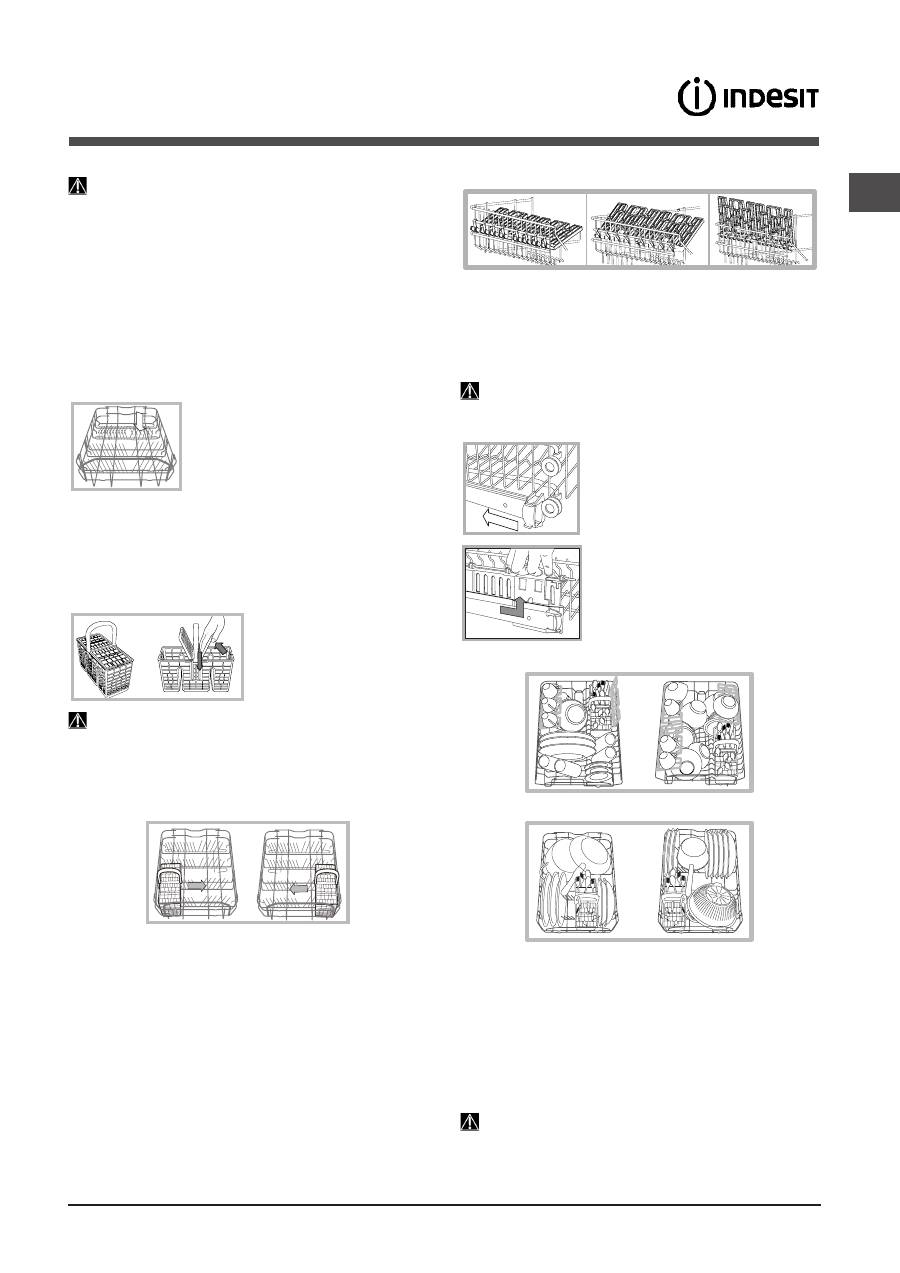Indesit DISP-547: Loading the racks
Loading the racks: Indesit DISP-547

EN
17
Loading the racks
*
Only available in selected models.
**
The number and position may vary.
Before loading the racks, remove all food residues from
the crockery and empty liquids from glasses and cups.
Arrange the crockery so that it is held in place firmly and
does not tip over.
After loading the appliance, check that the sprayer arms
can rotate freely.
Lower rack
The lower rack can hold pans, lids, plates, salad bowls, cutlery,
etc. as seen in the
Loading examples.
Plates and large covers should be placed at the sides of the
rack, ensuring that they do not block the rotation of the upper
sprayer arm.
Some dishwasher models are fitted with
tip-up sections
*
, which can be used
in a vertical position when arranging
plates or in a horizontal position when
arranging pans and salad bowls.
Cutlery basket
The type of cutlery basket may vary according to the dishwasher
model: The cutlery basket should be positioned at the front of
the lower rack, by sliding it between the fixed inserts, or on the
upper rack when the half load option has been selected (in
models featuring this option).
- It has a collapsible sliding
system which means the
cutlery can be arranged in the
best possible way.
Knives and other utensils with sharp edges must be placed
in the cutlery basket with the points facing downwards, or they
must be positioned horizontally in the tip-up compartments on
the upper rack.
Cutlery basket positioning examples
Upper rack
Load this rack with delicate and lightweight crockery: glasses,
tea and coffee cups, saucers, small salad bowls, saucepans and
small saucepans which are not too soiled, using the
Loading
examples as a guide.
• Mugs and cups, long sharp knives and serving utensils: place
these on the tip-up compartments
**
.
Tip-up compartments with adjustable tilt
*
- The tilt feature can be used to increase the space in the upper
rack, to position wine glasses with different stem lengths safely
and to improve drying performance.
-Lift the tip-up compartment, slide it gently and position it in the
desired tilt angle.
Adjusting the height of the upper rack
In order to make it easier to arrange the crockery, the upper rack
may be moved to a higher or lower level.
The height of the upper rack should ideally be adjusted
WHEN THE RACK IS EMPTY.
Never lift or lower the rack on one side only.
Open the left and right guide rail stops
and pull out the rack; position it higher or
lower as required, slide it along the guide
rails until the front wheels are in place and
close the stops
(see figure),
If the rack is fitted with
“Dual Space”
handles
*
(see figure), pull out the upper
rack until it reaches its stop point, grip
the handles at the sides of the rack and
move it upwards or downwards, then
slowly let it fall back into place.
Loading examples for the upper rack
Loading examples for the lower rack
Items which should not be washed in the dishwasher
• Wooden items, objects with wooden or horn handles or glued-
on parts.
• Items made from aluminium, copper, brass, pewter or tin.
• Items made from plastic material which is not heat-resistant.
• Antique or hand-painted porcelain.
• Antique silver. Silver which is not antique may, however,
be washed in the dishwasher using a delicate wash cycle,
provided that it does not come into contact with other metals.
We recommend the use of crockery which is dishwasher
safe.
Tilt A Tilt B Tilt C
Оглавление
- Installazione
- Descrizionedell’apparecchio
- Caricare i cestelli
- Avvio e utilizzo
- Programmi
- Brillantante e sale rigenerante
- Manutenzione e cura
- Precauzioni e consigli
- Anomalie e rimedi
- Operating instructions
- Installation
- Description of the appliance
- Loading the racks
- Start-up and use
- Wash cycles
- Rinse aid and refined salt
- Care and maintenance
- Precautions and advice
- Troubleshooting
- Mode d’emploi
- Installation
- Description de l’appareil
- Charger les paniers
- Mise en marche et utilisation
- Programmes
- Produit de rinçage et sel régénérant
- Entretien et soin
- Précautions et conseils
- Anomalies et remèdes
- Instrukcja obsługi
- Instalacja
- Opis urządzenia
- Napełnianie koszy
- Uruchomienie i użytkowanie
- Programy
- Środek nabłyszczający i sól regeneracyjna
- Konserwacja i utrzymanie
- Anomalie i środki zaradcze
- Návod k použití
- Instalace
- Popis zařízení
- Plnění košů
- Spuštění a použití
- Programy
- Leštidlo a regenerační sůl
- Údržba a péče
- Opatření a rady
- Poruchy a způsob jejich odstranění
- Руководство по эксплуатации
- Монтаж
- Описание изделия
- Загрузка корзин
- Включение и эксплуатация
- Программы
- Ополаскиватель и регенерирующая соль
- Техническое обслуживание и уход
- Неисправности и методы их устранения

